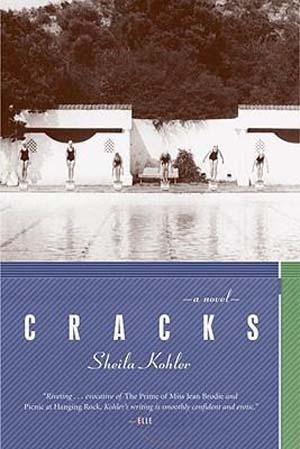Review: 'Cracks' by Sheila Kohler
 There seems to be an unspoken rule amongst readers that you should always try to read a book before you see the film, to the point where you miss out on seeing a film in the cinema because you haven't finished the book yet. But what happens when you see a great film and then realise it was based on a book? Quite often what happens is magic! Something you enjoyed has more to give because a book always has more. That's what happened with me and Cracks.
There seems to be an unspoken rule amongst readers that you should always try to read a book before you see the film, to the point where you miss out on seeing a film in the cinema because you haven't finished the book yet. But what happens when you see a great film and then realise it was based on a book? Quite often what happens is magic! Something you enjoyed has more to give because a book always has more. That's what happened with me and Cracks.Original Pub. Date: 1999
Publisher: Zoland Books
Now a major motion picture starring Eva Green and directed by Jordan Scott
A beautiful schoolgirl mysteriously disappears into the South African veld. Forty years later, thirteen members of the missing girl's swimming team gather at their old boarding school for a reunion, and look back to the long, dry weeks leading to Fiamma's disappearance. As teenage memories and emotions resurface, the women relive the horror of a long-buried secret. A stunning and singular tale of the passion and tribalism of adolescence, Cracks lays bare the violence that lurks in the heart of even the most innocent.On her website Sheila Kohler writes that after her sister's violent death in Apartheid South-Africa, she wanted to explore 'the reasons for violence within intimate relationships, in particular, the abuse of power and privilege' through writing. In Cracks she does exactly that, showing the reader how power dynamics establish themselves, how they change, get manipulated, and never truly die. Teenage girls provide endlessly interesting material to authors because we are so involved with each other and ourselves. There is a fascination which we as a society have with the strange mix between power and vulnerability, sexuality and innocence, and desire to be loved and anger at everything which signifies teenage girls in fiction. To what extent it is representative of actual teenage girls is different question but also a wrong one because it feels true. The cloying closeness of teenagers finds its best expression in boarding school narratives, where teenagers are removed from society and only have themselves.
I came to Cracks through the 2009 film adaptation by Jordan Scott which diverges from the novel on some crucial points. There are steps that Kohler is willing to take that were, seemingly, too far or too difficult for the adaptors. The violence and the abuse of power which Kohler is so fascinated with and describes so well in the novel does translate onto the screen but there is a romance and a beauty to it which Kohler actively avoids. The film's setting in Britain adds to the Romantic feel, while Eva Green as Miss G. is endlessly captivating. Partially based on her own memories of her South African boarding school, there is a sense to Cracks the novel that feels realer. The aches of missing parents, the uncomfortableness of growing up and the pure tedium of school come across very well and create the tense atmosphere required to allow for violence of intimate relationships to rise to the surface. The more immediate description of everyday worries which Kohler intersperses her novel with makes the novel feel more possible, which makes the ending all the more shocking. In some ways the film takes an easier way out of the story, depicting a horror which both abates the horror while also institutionalising it.
Sheila Kohler's prose is stunning. The novel is so descriptive that the reader can't help but see the South African veld and feel the simmering heat. There is a great unconventionality about Cracks. Chapters are as short or as long as they need to be, starting with little poems at times, chanting the praises and woes of the schoolgirls and their older selves. This split between present and past and Kohler's non-chronological way of telling the past gives the whole novel a sense of memory. It feels hazy and unsure for most of the novel and then suddenly crystal clear as Kohler reveals the truth of what happened. The constant peak at the primal and brutal nature of humanity below the veneer of polity is what makes Cracks reminiscent of The Lord of the Flies, but feels less moralistic in nature. It's harsher because teenage girls become harsher as they grow up.
I give this book...

4 Universes!
If you liked the film I can't necessarily say you will like the novel, but Kohler's Cracks is an absolutely stunning novel! It is enticing and fascinating, both abhorrent and beautiful. I'd recommend it to fans of Psychological Thrillers and Mystery.



Comments
Post a Comment